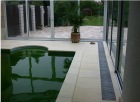Discreet heating for indoor swimming pools

To maintain comfortable conditions for indoor swimming pools, Diffusion Environmental Systems offers a solution to provide a primary heat source directly installed into the pool area — without spoiling the aesthetics of the interior or requiring complicated ducting arrangements.
The system address two major issues. One is the aggressive nature of chlorine to mechanical equipment. The other is the danger of water near electrical connections. Diffusion’s trench-heating system overcomes both problems and offers an unobtrusive high-output heating solution.
These trench units are made from high-quality stainless steel to resist the corrosive attack of chlorine. The spring-loaded roll-up grilles are supplied in natural anodised aluminium or white plastic and provide easy access for maintenance. Units also have a copper-to-copper spiral-wound heat exchanger that is resistant to chlorine, as well as being robust and easy to clean.
To deliver the high heating duties required for a pool area, the units have an IP55-rated axial fan that can withstand short periods of full immersion in water. Drain points ensure that any flooding is temporary. The DC motors run at 12 V and can be speed controlled.
Most units are supplied for heating only, but they can be supplied with a chilled-water coil. In the summer, they can be used to demist windows.







